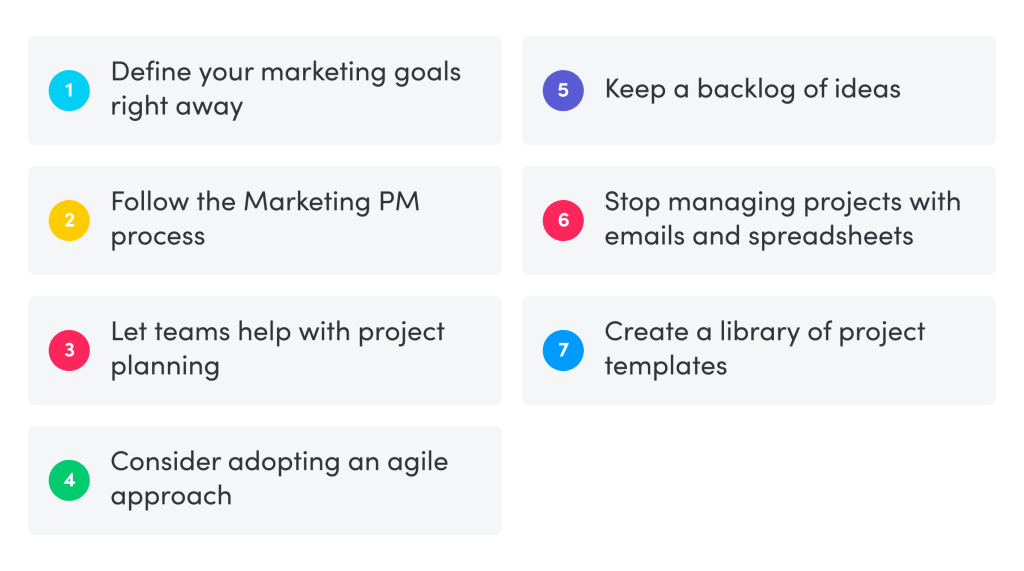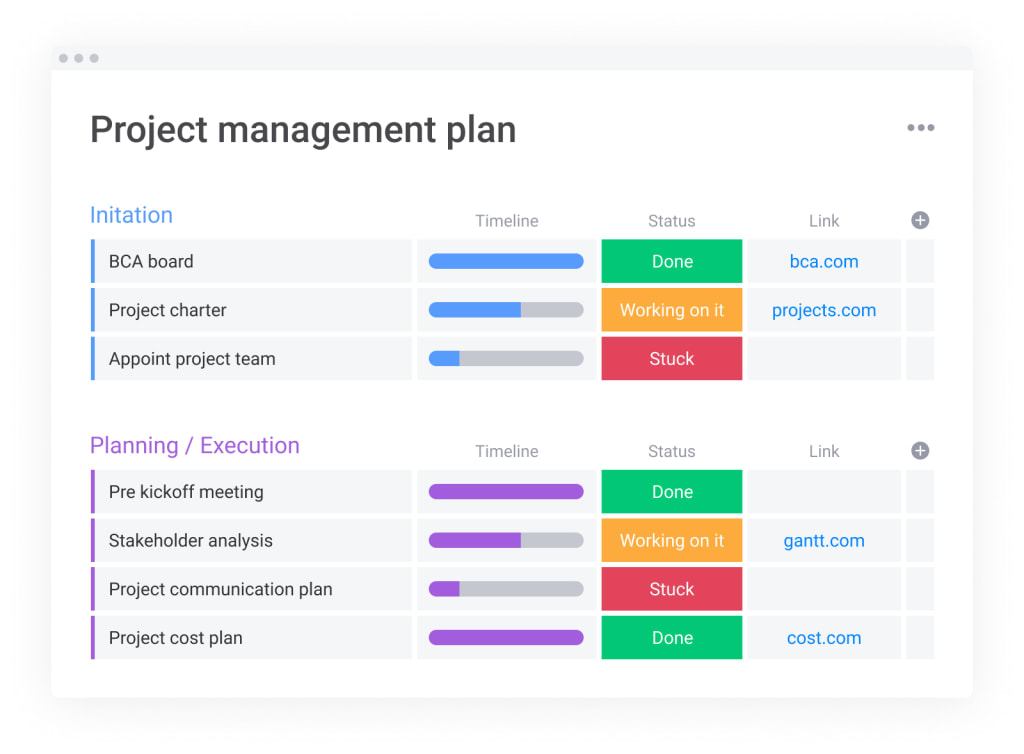Whether you’re a certified project manager or you just got thrown into the position, managing marketing projects is tough. There’s so much to do when it comes to managing marketing projects that you might be thinking, “How am I ever going to make this work?”
The good news: there are some tried and tested strategies you can use to make projects go off without a hitch. Marketing project management takes important project management principles and applies them to marketing campaigns.
Good marketing project management allows teams to work more efficiently, and it also helps keep marketing campaigns aligned with industry trends and consumer preferences.
So are marketing project managers the same as regular project managers?
Not exactly. Customer needs and expectations are constantly changing, so there’s more pressure to finish marketing projects on time. That’s where project management helps.
How do I organize a marketing project?
Planning and organizing a marketing project is similar to other projects. It involves researching, setting goals, and coming up with a marketing strategy. The difference is that your projects are specific to marketing, so research may look like:
- Studying industry trends
- Defining your target audience
- Creating or updating buyer personas if needed
All projects tend to have a lot of moving parts, but marketing projects are especially complex. This is because marketing projects require collaboration from a wide range of professionals, such as:
- SEO professionals
- Subject matter experts
- Writers and editors
- Graphic designers
- Event planners, developers, and more
Most marketing projects require a greater range of cross-team collaboration. It’s common for these projects to consist of remote and in-house teams, which can make marketing project management even more challenging if you’re not used to working with distributed teams, or if you’re not using the right marketing management software.
So what does this look like in a successful use case? Let’s look at that next.
How to successfully manage your marketing projects
Being an effective marketing project manager requires a special skillset.
You need to be flexible, quick to adapt to changes, and versatile enough to plan and execute different types of projects. One week you may be overseeing a project for an upcoming product launch, and the next week you could be updating buyer personas or expanding your video marketing campaign.
Marketing project managers must work in harmony with people from different departments. Otherwise, they’ll have difficulty delivering projects within time and under budget.
The good news is that we’ve come up with a list of tips that will help your upcoming marketing projects run smoother from start to finish.

1. Define your marketing goals right away
Any project without clearly defined goals and objectives is destined to steer off course. But in a fast-paced industry like marketing, where projects are constantly changing to align with customer preferences, not setting quantifiable goals is a recipe for failure.
That’s why it’s important to define your goals in the beginning stages of your project and measure the performance of your project over time. Common marketing goals include:
- Increasing market share
- Improving brand awareness
Getting more mailing list subscribers
2. Follow the marketing project management process
Regardless of industry, projects tend to follow the same 5 project lifecycle phases. These stages involve:
- Identifying a company goal or objective
- Planning a project that achieves that goal or objective
- Collaborating with teams
- Inspecting performance and managing stakeholder expectations
- Reviewing the highlights and low points after the project concludes
Marketing projects follow a similar pattern known as the marketing management process. Under this process, marketing projects are divided into five distinct stages:
- Conducting research: Teams research areas like industry trends, market data, and customer preferences
- Campaign planning: The project manager and stakeholders (often members of sales and development teams) set goals and draw up a project roadmap
- Launching marketing campaign: Once goals are set and the project is planned, teams start working on the project
- Measuring results: Management tests the performance of marketing content by reviewing marketing metrics and A/B testing
- Working iteratively: Constantly optimizing campaigns based on performance results and management recommendations
3. Let teams help with project planning
Include teams in the planning stage, especially if your marketing project involves a lot of interdisciplinary collaboration.
Since team members are the ones doing the work, they should have a better idea of what they are capable of delivering within a specific timeframe. They can help you set realistic timelines and budgets, which will help your projects run more smoothly.
4. Consider adopting an Agile approach
Agile project management lets teams break up large projects into smaller chunks known as sprints. The work delivered at the end of the sprint is then reviewed and either:
- Implemented
- Optimized with feedback in mind
This approach works well with ongoing marketing projects like content development and website optimization. Agile allows teams to continuously work on these campaigns so that the company’s marketing initiatives stay aligned with customer preferences.
5. Keep a backlog of ideas
Great marketing campaigns are built on creativity and good project management. While you can learn how to better manage projects, you can’t force creativity. Insights come when they want to, which isn’t always when you need them to.
Instead of brainstorming innovative marketing ideas one by one, create a global backlog of ideas and add to them every time you have an insight. Give everyone in your marketing department access to the backlog and encourage them to do the same.
You can even outsource idea generation by holding brainstorming sessions with members of other departments, which will give you a growing list of project ideas to work with while helping you save time when conducting the research phase of your project.
6. Stop managing projects with emails and spreadsheets
The days of collaborating via emails and spreadsheets are long gone. Project management for marketing requires teams, managers, and stakeholders to be in sync during every stage of the project. Emails and spreadsheets make it next to impossible for that to happen for two main reasons:
- It’s harder to keep track of information through emails
- Project information on spreadsheets can vary between teams since spreadsheets aren’t updated in real-time
You can stay up to date with your projects with the help of top project management software for marketing departments like monday.com, which is a Work OS that lets you easily plan and execute marketing projects, coordinate with teams and stakeholders, and share project-related documents under one digital workspace.
monday.com lets you keep an open channel of communication between everyone involved in your marketing projects while ensuring everyone is always using the same up-to-date project information.
7. Create a library of project templates
There’s a lot that goes into planning a project. Managers must devote time and energy to researching, creating budgets, hosting kickoff meetings, and so on. Getting a project ready for launch is a lengthy process, and the last thing you want is to make the process unnecessarily longer by building workflows. That’s where project templates can help.
Every effective marketing project manager should keep a library of templates for different types of marketing projects, like preparing for a product launch or publishing an ebook. That’s because templates allow you to roll out an entire project in a fraction of the time it would take to manually build a workflow. You can use templates to build the foundation of your project. All you must do is add in the specific details, like assigning tasks to individuals and setting deadlines.
How M Booth increased deliverables by 49% through effective marketing project management
Global communications company M Booth, which has clients across verticals in 32 markets around the world, was using Basecamp for marketing project management.
But as their business grew, it became difficult to keep track of the growing number of projects using that tool. They needed something new. That’s where monday.com came in.
“We used to spend a lot of time sending messages to the strategy team to tell them when something was done. And we do hundreds of things a week so there was a lot of manual work involved in just letting them know when even the smallest tasks were done. It made us feel more like secretaries and less like project managers,” said Kyle McEwen, M Booth’s Project Manager.
Now, using automations in monday.com, they can focus on the marketing work management tasks that matters most while working at maximum efficiency. This, along with smart dashboards and request pipelines with monday.com, helped them increase deliverables by 49%.
Approach project management like a pro
When it comes to project management, the good news is that if you use monday.com for planning and managing your marketing projects, most of the work is done for you.
With an extensive library of templates for marketing projects that are fully customizable, it’s easy to modify them to suit your specific needs. If you manage projects that are unique to your company, you can also create your own templates from scratch.
See just how easy it is to manage your marketing projects from start to finish.


